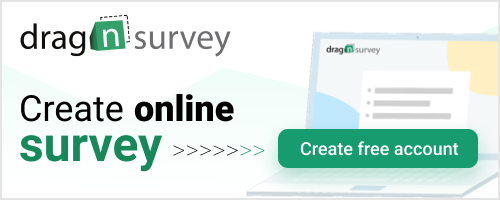Every question you write in a survey makes an important impact on the success of the results. With the right questions, you can achieve important information that can shape future projects, product development or customer service.
>> Create your Online Survey with Drag’n Survey, click here

However, there is often so much emphasis placed on the original aspects of the survey, that many brands forget about how to end the survey. Many believe that this section is not as important, as the rest of the document. However, in contrast, the closing aspect is probably just as important. That is because:
1. It Solidifies Brand Reputation
A survey is like a conversation with your audience. If you don’t end a conversation with someone politely, then it makes a negative impact on the audience’s impression with you. There are so many ways that you can end a conversation that will reflect negatively on your brand but only a few in which you can end positively.
2. You Want To Signify The End Of The Survey
Most people like to see an end of an activity be clear cut. Having an ending that is ambiguous can be disappointing and result in a negative opinion about the activity, in this case, the survey. Therefore, you always want to have a clear and concise ending.
3. You Need To Thank The Audience For Participating
One of the biggest mistakes that brands make when they write the end of a survey is that they don’t thank the audience for their time. Many of those taking part in a survey are doing it because they want to have their voice heard, there is often little compensation for completing a survey for the audience. If you don’t say thank you, then this can be upsetting for audience as they don’t feel their time has been appreciated.
The One Question You Should Never Ask to Close Your Survey
Of course, there are some default ways through which, you can end a survey. One of the most used options is that survey writers ask the audience if there is anything else the participant would like to add. This is a bad choice of ending the survey for several reasons.
Firstly, you are giving the audience a free hand to write information that is not relevant to the purpose of the survey. This can be a headache for your team while analyzing the answers. What if the information you’ve collected isn’t relevant to the overall survey? Where do you include this in the data in the results presentation?
In addition, even if you’re asking a lot of people to take the survey, you can be sure that only few people will agree if they have no direction. All questions must have a SMART goal according to them (specific, measurable, attainable, relevant and timely). If it doesn’t meet those requirements, then the questions really shouldn’t be on the survey.
For the common question “anything else”, there are lots of ways it doesn’t fit the SMART goal aspect. Firstly, it isn’t specific about any element. This can mean that people could comment about anything including customer service, products or even the survey itself. Secondly, the measurable aspect is also hard as there is no baseline to compare results against.
Finally, answers might not be relevant to the survey as a whole.
In addition, you should not repeat what the audience has told you. This can seem condescending and make a negative impression on your brand’s image.
How Should You End A Survey?
A survey should never finish on an open-ended question. You should take the time to thank your audience for taking the time to answer your questions. A good idea is to remind them of the purpose of the survey and how it will benefit them in the long term.
Last but not least, you should look at developing a standard ending that tells the audience that they have finished the survey and you are grateful for their time. You should also include a way for them to contact you should they wish to learn more about your brand or to speak to you further about the survey. For instance, a good ending might be:
Thank you for your time for completing our survey. Your opinions matter to us a lot and will help us develop the next line of products to help you save time and money when completing your finances. If you would like to learn more about us and how we’re developing the next line of financial management software, you can contact us here.
Conclusion
How you end the survey is just as important as how you write each question. Avoid certain ways to end the survey and you can be sure that your audience will be positive about ending your survey. At the same time, you will reduce your workload by not analyzing irrelevant responses.
More about surveys:
Make Better Decisions With Better Data, click here
How Surveys Enhance 360 Degree Feedback, click here
Entrepreneurial Best Practices For Using Surveys, clik here
The Problem With Ambiguous Survey Questions, click here
Your Go-To Software for Online Quiz Generation, click here
14 Questions To Ask For Your Customer Satisfaction Survey, click here
